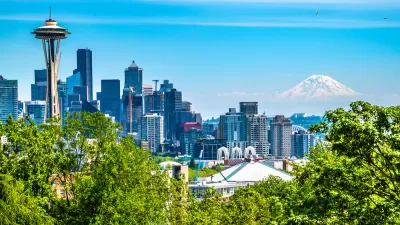Mostly unmentioned during the very public removal of Chinese leader Bo Xilai was the ambitious urban development program he led in Chongqing. Julia Zhou looks at those efforts and their uncertain future.
Following his masterful transformation of Dalian into a "into a clean, modern metropolis and financial hub" as the city's mayor, Bo Xilai remained vigilant in his efforts at urban transformation when he became Chongqing's leader in 2007. Xilai pushed forward signature environmental and construction projects like "Five Chongqings", "10 big cultural facilities" and efforts to provide social housing for lower income residents, notes Zhou.
"As one of his "Five Chongqings," a set of programs intended to improve residents' lives, Bo notably spent over $7 billion to turn the municipality – a heavily industrialized, mountainous region comprised of over 30,000 square miles and around 30 million people – into a "green Chongqing."
One of Bo Xilai's most ambitious efforts may have been his plan for "social housing." In 2010, "Bo planned to put up 800,000 apartments to be rented to low-income individuals, with construction handled by state-owned developers." Zhou adds, "With these buildings located in remote areas and largely devoid of tenants and commerce, the project's success is questionable."
Xilai was ousted from his party seat in March due to malfeasance. His industrious projects remain works-in-progress as Chongqing moves forward without his commanding presence.
FULL STORY: Bo Xilai’s Urban Legacy

Study: Maui’s Plan to Convert Vacation Rentals to Long-Term Housing Could Cause Nearly $1 Billion Economic Loss
The plan would reduce visitor accommodation by 25,% resulting in 1,900 jobs lost.

North Texas Transit Leaders Tout Benefits of TOD for Growing Region
At a summit focused on transit-oriented development, policymakers discussed how North Texas’ expanded light rail system can serve as a tool for economic growth.

Why Should We Subsidize Public Transportation?
Many public transit agencies face financial stress due to rising costs, declining fare revenue, and declining subsidies. Transit advocates must provide a strong business case for increasing public transit funding.

How Community Science Connects People, Parks, and Biodiversity
Community science engages people of all backgrounds in documenting local biodiversity, strengthening connections to nature, and contributing to global efforts like the City Nature Challenge to build a more inclusive and resilient future.

Alabama: Trump Terminates Settlements for Black Communities Harmed By Raw Sewage
Trump deemed the landmark civil rights agreement “illegal DEI and environmental justice policy.”

Dear Tesla Driver: “It’s not You, It’s Him.”
Amidst a booming bumper sticker industry, one writer offers solace to those asking, “Does this car make me look fascist?”
Urban Design for Planners 1: Software Tools
This six-course series explores essential urban design concepts using open source software and equips planners with the tools they need to participate fully in the urban design process.
Planning for Universal Design
Learn the tools for implementing Universal Design in planning regulations.
City of Santa Clarita
Ascent Environmental
Institute for Housing and Urban Development Studies (IHS)
City of Grandview
Harvard GSD Executive Education
Toledo-Lucas County Plan Commissions
Salt Lake City
NYU Wagner Graduate School of Public Service





























